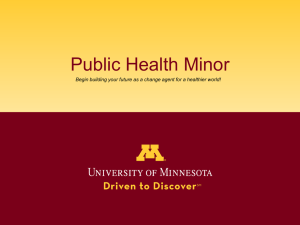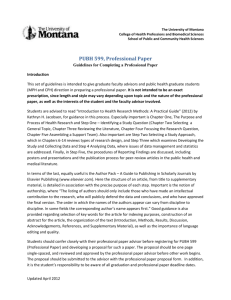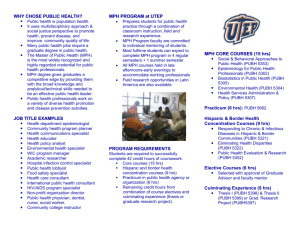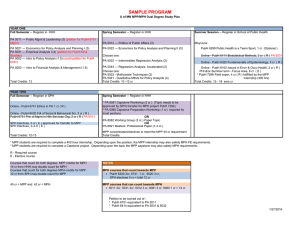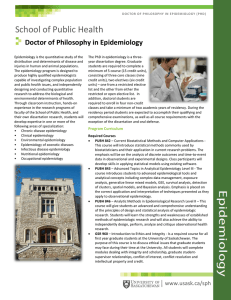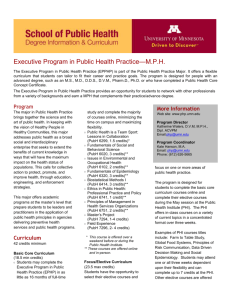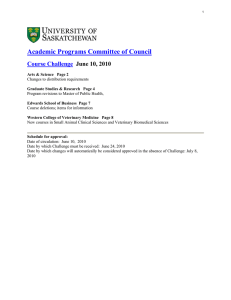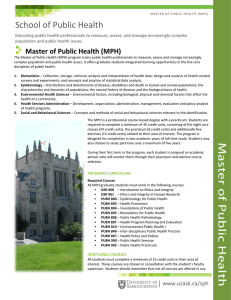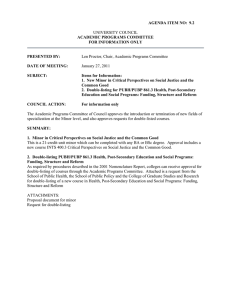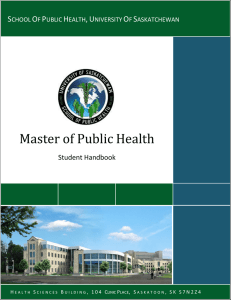School of Public Health
advertisement
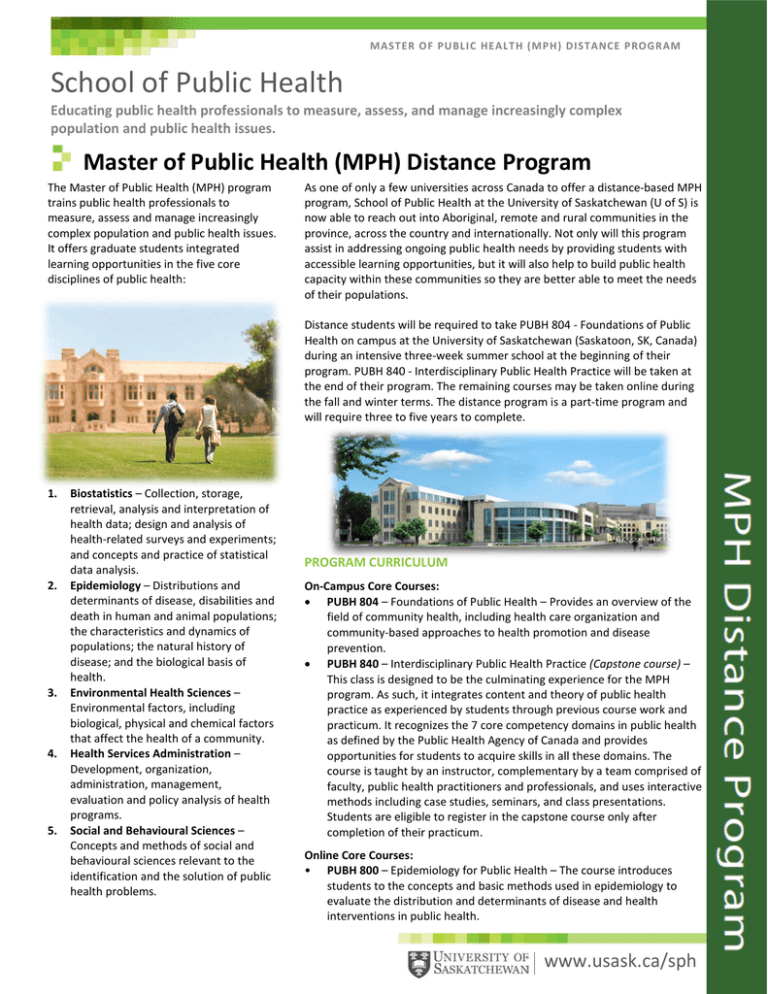
MASTER OF PUBLIC HEALTH (MPH) DISTANCE PROGRAM School of Public Health Educating public health professionals to measure, assess, and manage increasingly complex population and public health issues. Master of Public Health (MPH) Distance Program The Master of Public Health (MPH) program trains public health professionals to measure, assess and manage increasingly complex population and public health issues. It offers graduate students integrated learning opportunities in the five core disciplines of public health: As one of only a few universities across Canada to offer a distance-based MPH program, School of Public Health at the University of Saskatchewan (U of S) is now able to reach out into Aboriginal, remote and rural communities in the province, across the country and internationally. Not only will this program assist in addressing ongoing public health needs by providing students with accessible learning opportunities, but it will also help to build public health capacity within these communities so they are better able to meet the needs of their populations. Distance students will be required to take PUBH 804 - Foundations of Public Health on campus at the University of Saskatchewan (Saskatoon, SK, Canada) during an intensive three-week summer school at the beginning of their program. PUBH 840 - Interdisciplinary Public Health Practice will be taken at the end of their program. The remaining courses may be taken online during the fall and winter terms. The distance program is a part-time program and will require three to five years to complete. 1. 2. 3. 4. 5. Biostatistics – Collection, storage, retrieval, analysis and interpretation of health data; design and analysis of health-related surveys and experiments; and concepts and practice of statistical data analysis. Epidemiology – Distributions and determinants of disease, disabilities and death in human and animal populations; the characteristics and dynamics of populations; the natural history of disease; and the biological basis of health. Environmental Health Sciences – Environmental factors, including biological, physical and chemical factors that affect the health of a community. Health Services Administration – Development, organization, administration, management, evaluation and policy analysis of health programs. Social and Behavioural Sciences – Concepts and methods of social and behavioural sciences relevant to the identification and the solution of public health problems. PROGRAM CURRICULUM On-Campus Core Courses: • PUBH 804 – Foundations of Public Health – Provides an overview of the field of community health, including health care organization and community-based approaches to health promotion and disease prevention. • PUBH 840 – Interdisciplinary Public Health Practice (Capstone course) – This class is designed to be the culminating experience for the MPH program. As such, it integrates content and theory of public health practice as experienced by students through previous course work and practicum. It recognizes the 7 core competency domains in public health as defined by the Public Health Agency of Canada and provides opportunities for students to acquire skills in all these domains. The course is taught by an instructor, complementary by a team comprised of faculty, public health practitioners and professionals, and uses interactive methods including case studies, seminars, and class presentations. Students are eligible to register in the capstone course only after completion of their practicum. Online Core Courses: • PUBH 800 – Epidemiology for Public Health – The course introduces students to the concepts and basic methods used in epidemiology to evaluate the distribution and determinants of disease and health interventions in public health. www.usask.ca/sph • • • PUBH 803 – Health Promotion – This course covers the underlying concepts, principles, historical development, theory, and current practice of health promotion. The focus of learning is not so much on “how to do” health promotion, as on “how to think” about the conceptual, ideological, and political issues which underlie health promotion practice. Topics include: empowerment and community, change in individuals, small group development, community organization, healthy public policy, coalition-building and advocacy, linking research and action. PUBH 805 – Biostatistics for Public Health – This course is designed for students who wish to understand basic biostatistical methods and principles as they apply to public health data. The methods include descriptive statistics, confidence intervals and hypothesis testing, analysis of variance, non-parametric methods, multiple regression and logistic regression. The emphasis of the course is on applications of these methods to public health data, on correct interpretations of the resulting analyses as to be presented to both public health professionals and general lay audiences, and on the critical appraisal of these methods as used in the public health literature. The course also introduces the computer software program SPSS as it applies to the statistical topics discussed in the course PUBH 867 – Health Policy and Politics - An introduction to theory, research and practice in the field of health policy. More specifically, the course will provide an opportunity to critically examine the process of health policy development, analysis and implementation as well as better understand what influences policy. • • PUBH 810 – Environmental Public Health – This course is designed to provide students with an introduction and overview of the key areas of environmental health. This course will cover factors associated with the development of environmental health problems, principles derived from core environmental health disciplines, “tools of the trade” and specific agents of environmental diseases. Finally, applications and domains of environmental health are addressed (e.g., water and air quality, food safety, waste disposal, and occupational health). PUBH 807 – Health Program Planning and Evaluation – This course covers basic concepts and principles of the cycle of health program planning, which includes needs assessment, program development and implementation, process, impact, and outcome evaluation. Both qualitative and quantitative data collection will be addressed. Guest speakers, case studies, and assignments will link conceptual material with concrete applications. Online Elective Courses: • AGMD 800 – Public Health in the Agricultural Rural Ecosystem (PHARE) • NURS 814 – Aboriginal Health Issues • NURS 892 – Research Methods • NURS 893 – Qualitative Research Methods Practicum Course: • PUBH 992 – Public Health Practicum Students register in the practicum after completing the seven core required courses, usually in the spring/summer term. However, it is possible to do the practicum during any term. APPLICATION QUALIFICATIONS Applicants to the MPH distance program should hold a bachelor or higher degree in one of the health sciences, life sciences, social sciences or business with a minimally attained cumulative weighted average of 70% or greater in the last two years of study. All candidates must also meet the admission requirements of the College of Graduate Studies and Research at the University of Saskatchewan. For more information on admission requirements, please visit www.usask.ca/sph. APPLICATION DEADLINE The MPH distance program offers one starting date in August every year. Application deadline for the program is March 1st, with application reviews occurring in the spring. CAREER PATH Many Public Health employers require a graduate degree in public health. An MPH degree emphasizes the use of academic knowledge as a basis for evidence-based public health practice and policy development. The program combines academic learning with opportunities to gain practical experience under the mentorship of public health practitioners. The MPH degree prepares public health professionals for careers in the public, non-profit and private health sectors of the economy. MORE INFORMATION For more information regarding our program, courses, prerequisites, and tuition fees, please visit: Website: www.usask.ca/sph Email: sph.admissions@usask.ca
